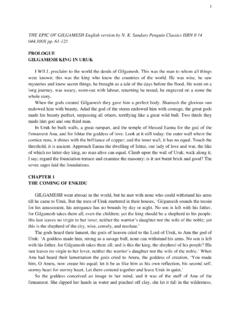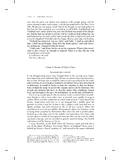Transcription of LORD BYRON: Manfred - L. Adam Mekler
1 LORD BYRON: Manfred In European terms, Manfred was the most celebrated and influential of all Byron's works. It was translated into German, for instance, eighteen times during the nineteenth century once by Wagner's uncle. Byron had little idea, at first, what he had written, until his anger at the way Murray and Gifford interfered with his text forced him to realise how proprietorial he felt about it. Often ignored is the fact that Manfred is Byron's first dramatic piece, done when memories of Drury Lane and its capacity for spectacular scenery would have been fresh in his mind. I have no evidence for my theory that Manfred is a role written for Edmund Kean. The presence of the short, dark, but mesmeric Kean behind such verse figures as conrad in The Corsair has often been noted: here at last, in Manfred , was a role he might play. Some mystery surrounds the play's writing.
2 Its draft manuscript is unusually for Byron . undated, and Hobhouse, who may be supposed to have been with Byron for much of the time of its composition, appears never to register that it is in If I am right, and the notes to Thomas Taylor's translation of Pausanias are a major influence on the way Byron creates its demon- hierarchy, 2 then he is already thinking about it between May 1st (when he is at Brussels) and June 23rd 1816 (when he is at Evian) for he asks Hobhouse for Taylor's book on those dates;3 and as Hobhouse arrives at Diodati on August 26th (with Taylor's Pausanias, we must assume: he promises on July 9th to bring it) 4 it's unlikely that anything beyond the very first scene was written before late August. The Alpine scenes in Act I and II bear a close relationship with Byron's Alpine Journal (September 17th-29th), as the notes below will show; but, as Jerome McGann writes,5 stanzas 5 and 6 of the Incantation in the first scene is on paper with a fleur-de-lys watermark of a kind Byron used in 1813 and 1814.
3 The Incantation was fair-copied, in July 1816, by Claire Clairmont, in the note- book which also contains her version of Childe Harold III, and had already been published in late November or early December 1816, in The Prisoner of Chillon, and Other Poems. See my notes below for the suspicion of a link between the Incantation and Coleridge's Christabel. The revised and received Third Act seems to have been drafted at Rome by May 5th 1817,6 Byron having arrived in that city on April 29th. Manfred is a much deeper fellow than any of Byron's previous protagonists; Childe Harold makes no pretence to being a philosopher, or a theologian of dualism, still less a sun-worshipper, and The Giaour, conrad , Selim and Alp appear not to bother with the questions which have obsessed Manfred ;. though his indifference and hostility to Christianity is shared by The Giaour, at least.
4 The play borrows from so many mythologies that even Byron was self-conscious about it: .. a mixed mythology of my own which you may suppose is somewhat of the strangest was the way he alerted Kinnaird, on March 25th 1817:7 an Olla Podrida was what his concoction was called in an early review, by William Peacock, always on the alert for absurdities in Byron, gives a note to Nightmare Abbey: According to Mr. Toobad, the present period would be the reign of Ahrimanes. Lord Byron seems to be of the same opinion, by the use he has made of Ahrimanes in Manfred ; where the great Alastor, or ?a??? ? a ? ??, of Persia, is hailed king of the world by the Nemesis of Greece, in concert with three of the Scandinavian Valkyr , under the name of the Destinies; the astrological spirits of the alchemists of the middle ages; an elemental witch, transplanted from Denmark to the Alps; and a chorus of Dr.
5 Faustus's 1: See Cochran, Nobody has seen it Byron's First Letter Announcing Manfred , Byron Journal, 1996, pp. 68-76. 2: See Cochran, Manfred and Thomas Taylor, Byron Journal 2001, pp. 62-71. 3: BLJ V 74 and 80. 4: BB 228. 5: CPW III 464. 6: See Cochran, A higher and more extended comprehension : Byron's three weeks in Rome, Keats-Shelley Review 2001, pp. 49-63. 7: BLJ V 195. 8: The British Critic, 2nd series, VIII, July 1817, RR BI 275. devils, who come in the last act for a soul. It is difficult to conceive where this heterogeneous mythological company could have originally met, except at a table d'h te, like the six kings in Candide .9. Peacock omits the Neo-Platonist Thomas Taylor, from whom Byron derived the revolutionary idea that Man could damn himself without help from any Evil Principle. As George Sand wrote, Manfred is Faust d livr de l'odieuse compagnie de M phistoph l s.
6 It is the superiority Manfred displays to all the transcendental powers he encounters which makes him worrying. He is equally indifferent to the persuasions of chamoix-hunters, witches, demons and abbots, and is self-destructive purely on his own terms not at all like Faust, or Faustus, who need and receive help in their self- destruction (and redemption, in the case of Faust). Manfred has no-one to blame for his own doom but himself; he is cunning in [his] overthrow, / The careful pilot of [his] proper woe. Lying behind Manfred 's need for oblivion at all costs may be Byron's self-horror at the way, late in 1815 and early in 1816, he had wilfully destroyed the happiness of a wife who loved him, whom he despised because she loved him, and whom he had forced to leave their home, shortly after she had born him their child. His behaviour had been so extreme that many about him were convinced that he was either ill or insane.
7 Astarte all that Manfred offers by way of heroine is often taken, by those intent on creating sensation at all costs, to be a version of his half-sister Augusta; but I'd argue that in her remoteness and verbal economy Astarte is closer to Annabella. Annabella could be a very effective rhetorician (on paper, in private), but in public she said as little as possible. Even her statements about Byron's cruelty made to convince her family and legal advisers that she had a good case are understated. He married the woman to whom, even in 1812, he was comparing to Emma in Edgeworth's The Modern Griselda,10 knowing her to be, in her infinite patience, his perfect victim. The manipulative hypocrisy whereby, knowing that the outcome would be cruel and disastrous, he made her his wife, and his affectation of not understanding what, when she left the house, all the fuss was about, seem gross even after two centuries, and deserve the implicit critique he made of them himself in Manfred : By thy cold breast and serpent smile, By thy unfathomed gulphs of Guile, By that most seeming virtuous eye, By thy shut soul's Hypocrisy, By the perfection of thine art Which passed for human thine own heart, By thy delight in others' pain, And by thy brotherhood of Cain, I call upon thee!
8 And compell Thyself to be thy proper Hell!11. In so far as he knows himself to have placed himself beyond the pale of human tolerance, Manfred is Byron.. This edition is based on the rough draft at the Pierpont Morgan Library, New York, and the fair copy and associated letter in the John Murray Archive, collated with the editions of and 9: Peacock, Nightmare Abbey, note to Chapter IV. 10: BLJ II 199; Emma is the gentle, charitable heroine, contrasting with the eponymous one. 11: Manfred , I i, 252-51. Manfred . A Dramatic Poem. There are more things in heaven and earth, Horatio, Than are dreamt of in your philosophy.. The scene of the drama is amongst the higher Alps, partly in the castle of Manfred , and partly in the mountains. Act I scene i. Manfred12 alone. Scene, a Gothic Gallery. Time, midnight. Manfred . The Lamp must be replenished, but even then It will not burn so long as I must watch.
9 My Slumbers if I slumber are no sleep, But a continuance of enduring thought, Which then I can resist not; in my heart 5. There is a Vigil and these eyes but close To look within and yet I live, and bear The aspect and the form of living men. But Grief should be the Instructor of the wise;. Sorrow is knowledge:13 they who know the most 10. Must mourn the deepest o'er the fatal truth . The Tree of Knowledge is not that of Life. Philosophy and science and the springs Of wonder and the wisdom of the World . I have essayed, and in my mind there is 15. A power to make these subject to itself, But they avail not; I have done men good And I have met with good even among men . But this availed not; I have had my foes, And none have baffled many fallen before me 20. But this availed not: Good or evil life . Powers passions all I see in other beings Have been to me as rain unto the sands.
10 Since that all nameless hour, I have no dread . 12: Manfred : the name comes in part from the Purgatorio (III 121-4) in part from Walpole's The Castle of Otranto (1764) but in part from Bertram, or the Castle of St. Aldobrand, by Charles Maturin (1782- 1824) a play which had been mounted on Byron's recommendation, and ran, from May 9th 1816, for twenty two consecutive nights a great success. Murray printed seven editions in the first year. Byron was impressed by the piece (see his letter to Maturin of 21st December 1815, offering to get George Lamb to re-write some unsatisfactory passages BLJ IV 336) and certainly took note of the name of the protagonist's hideaway: .. Count Bertram, Whose vessel had from Manfredonia's coast Been traced towards this realm .. (IV i). On Manfredonia's wild and wooded shore His desperate followers awed the regions round.

